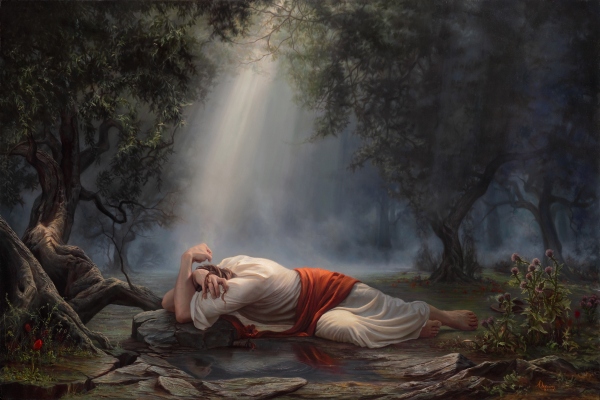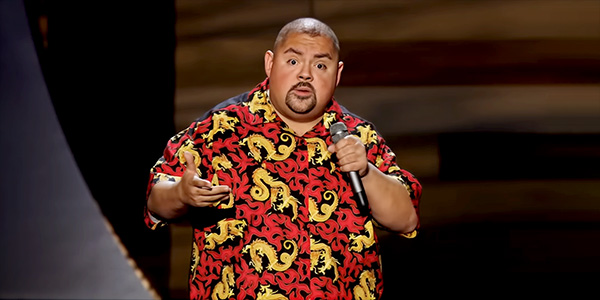Then they arrived at a place called Gethsemane, and Jesus said to the disciples, “Sit down here while I pray.”
He took with him Peter, James and John, and began to be horror-stricken and desperately depressed.
“My heart is nearly breaking,” he told them. “Stay here and keep watch for me.” (Mark 14:32-34 PHILLIPS)
It’s hard to imagine Jesus, the Son of God and Savior of the world, being “horror-stricken and desperately depressed.” And yet, it happened. Jesus was facing the greatest test of His time on earth, and He was facing it as a human being.
It’s difficult to wrap your brain around the concept of Jesus being both fully divine and fully human, rather than being some sort of a spiritual half-breed.
But if there are any doubts about Jesus being fully human, his anguish in the Garden of Gethsemane should put those to rest. He knew what He was about to face, and He needed strength to get through it. Matthew’s account of this episode words it this way:
He took Peter with him and Zebedee’s two sons James and John, and began to be filled with anguish and despair.
Then he told them, “My soul is crushed with horror and sadness to the point of death. . . stay here. . . stay awake with me.” (Matthew 26:37-38 TLB)
Despair.
The One who was the Light of the World, who came to bring hope to everyone in it, was filled with . . . despair.
So considering this, is it any great wonder that we can feel despair when we face our moments of greatest testing?
And to take that one step further, usually when we are having our moments of fear and torment, the worst thing that we are facing is the unknown. We are scared, because we wonder what is going to happen. Will I have the strength to endure this trial? What will people think of me if I fail? What am I about to lose? Do I really want to know the answers to these questions?
Jesus didn’t have the luxury of fearing the unknown. He knew EXACTLY what was about to happen. And it scared Him. A lot.
ARC 4 – Mix faster and more confidently than ever
Let’s be clear about this. Jesus, the Son of God, knew why He had come to earth. He knew He had work to do, and He knew He had to finish that work.
But Jesus the son of Mary and Joseph said this:
“Father, if it is your will, take this cup of suffering away from me. However, your will must be done, not mine.” (Luke 22:42 GW)
Jesus knew going into this time of prayer what God’s answer was going to be. He knew what He had to do, but He was NOT excited about it.
Nevertheless, He submitted to His Father’s will. He did not want to go through with His arrest, torture and execution, but more than that, He did not want to go against His Father’s will.
The Greek word regarding God’s will in this sentence is ginomai. This signifies that Jesus is not only saying that God’s will must be done, but that it must be. In other words, God’s will is eternal, just as God is eternal.
In light of His knowledge of this, Jesus really didn’t have any illusion that His prayer was going to be answered with a “yes.” And yet, He prayed for God to let Him off the hook anyway.
Perhaps this knowing was the greatest reason for His despair? He knew He wasn’t getting out of this. I can’t even imagine what He must have felt like in the garden.
And yet, He remained submissive, because He never lost focus on what His greatest mission was. And that was simply for God’s will to be done. Jesus was sincere about completing His work. He isn’t just saying “Your will be done,” to sound pious, like it’s the right thing to say while praying.
It is, of course, the right thing to say, but it is also the right thing, period.
Because God’s will wasn’t about Jesus the man doing something He didn’t want to do. It was about Jesus the Savior bring God’s plan of salvation to fulfillment:
Jesus Christ did the things God wanted him to do. And because of that, we are made holy through the sacrifice of Christ’s body. Christ made that sacrifice one time—enough for all time. (Hebrews 10:10 ERV)
This sacrifice began not on the cross, but in the garden, when Jesus made up His mind to be in agreement with God’s will. Because of this resolution, and the confirmation of His purpose that it signified, we are able to approach God today as His adopted children.
But this is about more than our salvation. Heaven will be awesome, of course, but what about the here and now?
Do you ever have situations that you know you won’t be strong enough to face by yourself? Isn’t it helpful to know, then, that even Jesus needed to be strengthened not only by angels and the Holy Spirit, but also His three best buds? It is much less difficult to say to God, “Your will be done” when you have your closest friends surrounding and supporting you.
It is not likely that any of us will ever have to face a crucifixion, and we DEFINITELY won’t ever have the weight of the sins of the world upon our own shoulders.
Nevertheless, when I am faced with something I really don’t want to do, and fear is holding me back, it helps at least to know that the God to whom I pray knows a thing or two about fear and apprehension.
But it helps me even more to know that He still got the job done.


